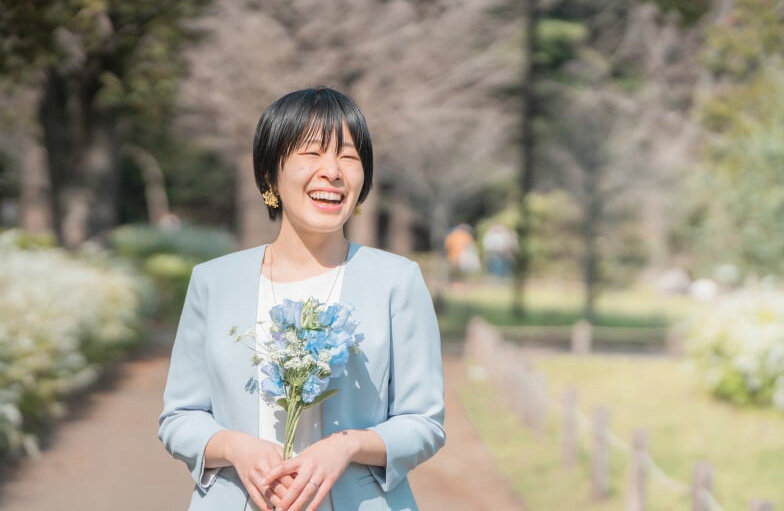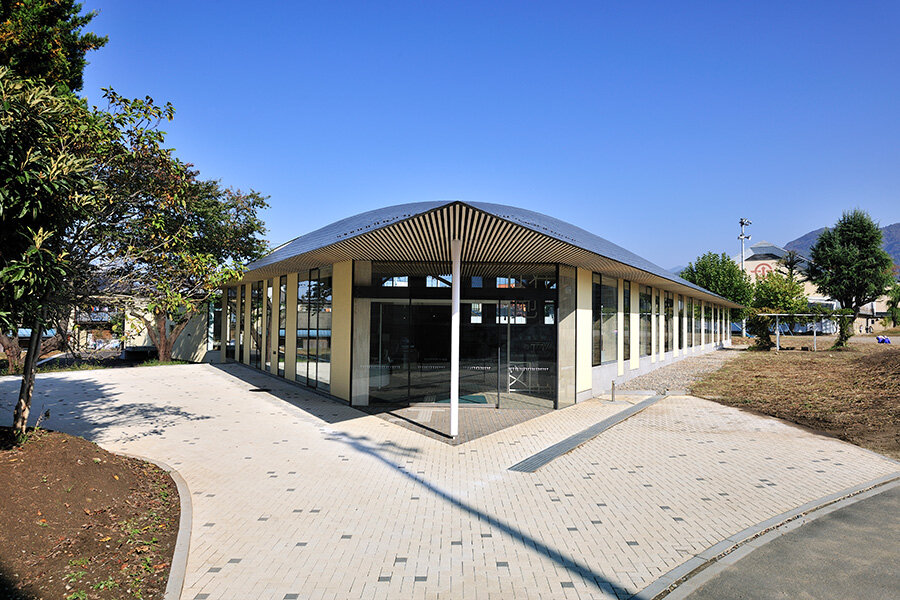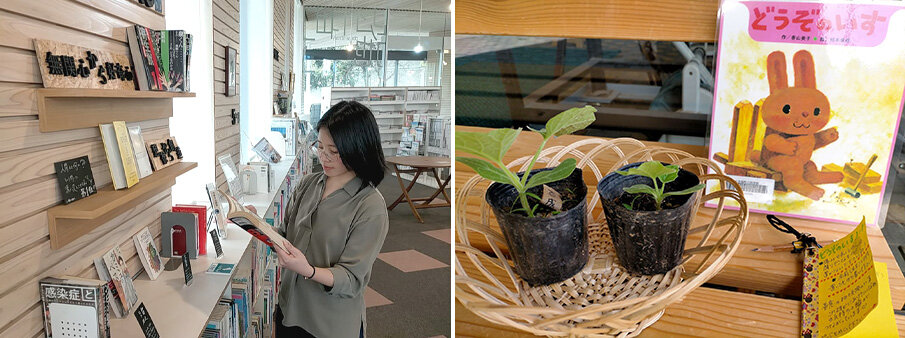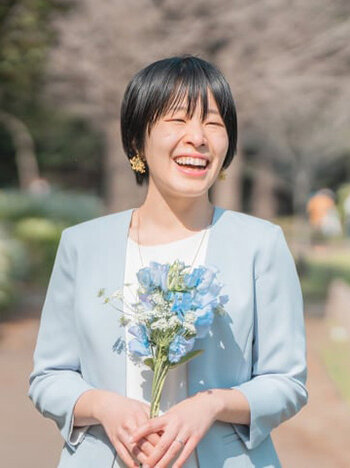Director, Obuse Town Library Machi Tosho Terrasow
September 2016 B.A. in Arts and Sciences (Major: Sociology, Minor: Japanese Studies)
Valuing the Sincerity of Using Words to their Fullest, as Learned at ICU

Working to Turn "Information" into "Intelligence"
I serve as the director of Machi Tosho Terrasow, a municipal library in Obuse, Nagano Prefecture. This public facility was created through a collaboration between the local government and residents, based on the philosophy of being a "cultural hub for enjoying interaction and creativity." With four key pillars - "a place for learning," "a place for child-rearing," "a place for community engagement," and "a place for information sharing" - we strive to make it more than just a place to read books but rather a welcoming space for everyone. One of the most rewarding moments for me was hearing from a visitor who said, "At other libraries, my child was scolded for making noise, but here, the staff helped soothe him, and I was really grateful."

Exterior of Machi Tosho Terrasow, Obuse's Municipal Library
I transitioned from being a consultant to becoming the director of this library at the age of 27. Wanting to make the library accessible to people beyond just book lovers, I have taken on various challenges. One of these is organizing a large-scale festival called "Monogatari-sai" (Story Festival), which attracts around 2,000 attendees, allowing people to eat, drink, read, and enjoy books in a fun environment. Every year, theme-related books curated by both the library and its visitors are displayed throughout the festival grounds, ensuring that attendees naturally encounter books while enjoying different activities. We also value human connections as the most up-to-date and valuable source of information. To encourage engagement, we design various interactive events such as tasting rare delicacies from around the world while listening to the experiences of a global culinary explorer or visiting art museums with visually impaired individuals to appreciate art together. Beyond one-time events, we have also launched long-term programs initiated by our visitors, forming clubs and activities that actively utilize the library's space and resources. This truly embodies the idea of a "commons for everyone." Hearing people say, "I wasn't much of a reader before, but I never knew a library could offer experiences like this!" has been incredibly fulfilling.
On a daily basis, we create unique themed shelves, such as "OSHI Shelf," where visitors showcase their recommended books, and "BUNMYAKU Shelf," which connects books from different genres through meaningful associations. I view libraries as spaces that curate and present perspectives on the world, and at the core of this approach is the desire to provide not just "information" but "intelligence." Traditionally, libraries organize books by genre based on classification numbers, but I believe that intentionally arranging books in a way that highlights their connections - asking "How are these books related?" or "What new perspectives emerge when these books are read together?" - allows visitors to acquire knowledge in a more multidimensional way and develop their own worldview. This philosophy aligns closely with the liberal arts education I received at ICU, where I learned to explore diverse academic fields and understand the interconnectedness of knowledge. That experience continues to influence my work today.

Left: Shiga at work Right: Library event: A community barter exchange inspired by the picture book "Dozo no Isu"
A Busy Time at ICU: Academics, Internships, and Founding a New Organization
I chose ICU because I was drawn to its global environment and small class sizes, which allowed me to focus on my studies. Once enrolled, I found myself constantly busy with classes and assignments. This environment helped me develop the habit of studying with focus and adopt a learning approach that emphasized questioning and exploration - very different from the passive learning style I had followed in high school.
In my third year, I majored in sociology with a minor in Japanese studies. For my senior thesis, however, I sought guidance from a professor specializing in psychology and wrote my research paper on leadership. It was an unconventional path, but my professor welcomed my approach, for which I remain deeply grateful. My interest in leadership stemmed from my experiences in middle and high school. While engaging in NPO activities related to international cooperation, I often wondered why so few people perceive social issues as their own concerns, even when these problems are so widespread, and how we can increase the number of people who actively work to improve society. These questions led me to pursue leadership studies in earnest.
I was also actively involved in leadership and organizational development outside of ICU. From my second year, I interned at an organization that supported corporate development and executive training. In my fourth year, I founded a career education organization. Though I was in the process of establishing it as a legal entity before graduation, I began to feel uneasy about hitting a ceiling in terms of my skills and abilities. This led me to join a consulting firm instead.
As a consultant, I worked in new business development and organizational development, which helped me build a strong foundation in business in a short period. While the work was fulfilling and enjoyable, I started feeling a disconnect with the relentless pursuit of growth and change... During the COVID-19 pandemic, as the world came to a standstill, I began to question whether people needed something beyond just growth--perhaps a sense of belonging or even moments of aimlessness. After four years, I decided to leave the consulting industry. It was around this time that I came across a job listing for the library director position in Obuse. The library's concept resonated with my own values, and I had an instinctive feeling that this could be interesting. I was also familiar with Obuse, having visited the town several times due to its reputation for innovative community planning. This connection led to my appointment as library director, bringing me to where I am today.

Left: At a social innovator retreat Center: As the representative of a student organization Right: Completion of senior thesis
Still Valuing the Sincerity of Using Words to their Fullest, as Learned at ICU
I often find myself realizing just how much ICU has influenced me. One of the most significant lessons I took away is what I would call the "sincerity of using words to their fullest." I came to appreciate its importance through conversations with professors and peers at ICU. Although it was after I graduated, one event that left a strong impression on me was the dialogue between students and the university during the COVID-19 pandemic. When in-person classes could not be held, students organized a petition asking for reductions in facility fees and tuition. The university's response was remarkable and even gained attention on social media. It carefully explained why fee reductions were difficult, how funds were allocated, and how they prioritized supporting the students who needed help the most. The message also encouraged students to rethink the concept of "unfairness." The way the university communicated this, with such thoughtfulness and depth, truly reflected ICU's commitment to dialogue. Now that I'm in a management role myself, I've come to appreciate the importance of using words with care even more.
ICU's emphasis on critical thinking - considering things from multiple perspectives and questioning them deeply - has also become second nature to me. My mother used to tell me, "If you ever stop doubting, you've lost your heart." I've always valued uneasy feelings and the ability to question whether something is truly right, as I believe it helps us see the unseen. This mindset aligns closely with critical thinking, and ICU further strengthened my ability to constantly ask, "Is this really true?" I believe that those who often find themselves in doubt are the ones best suited for ICU.
To high school students and younger generations, I want to say: "Think about what you can do right now." At 30 years old, I realize that there are opportunities unique to different stages of life, for example at 18 vs at 30. For example, as a student, you have the rare privilege of connecting with people without any conflicts of interest. The friends you meet during this time will later go their own ways, expanding your world as they pursue different paths. Many of my ICU friends have gone into various paths such as business, welfare, art, writing, and comedy, providing me with constant inspiration.
Of course, studying hard is another experience that is unique to student life. Once you enter the workforce, even if you want to study, you may not be able to dedicate yourself to it as fully as you did as a student. Studying is a student's primary responsibility, but it is also a privilege. I hope students will recognize this and strategically think about what they can do with their current position in life.

Left: Inside the library Right: At work
Profile
Arika Shiga
Director, Obuse Town Library Machi Tosho Terrasow
September 2016 B.A. in Arts and Sciences (Major: Sociology, Minor: Japanese Studies)
During middle and high school, she engaged in international cooperation through an NPO. While studying at ICU, she interned at an organization providing executive education. In her fourth year, she founded a career education organization (which was later incorporated). After graduation, she joined a consulting firm, where she worked on new business development and talent/organizational development projects. After four years, she left the firm and, in April 2021, became the director of Obuse Town Library Machi Tosho Terrasow.




